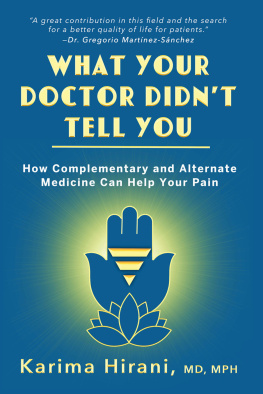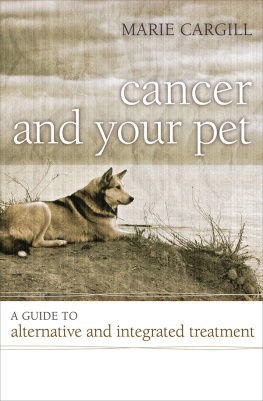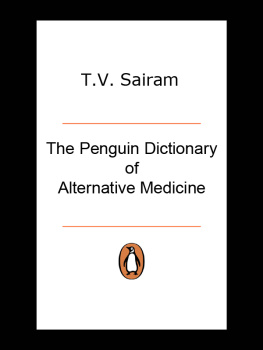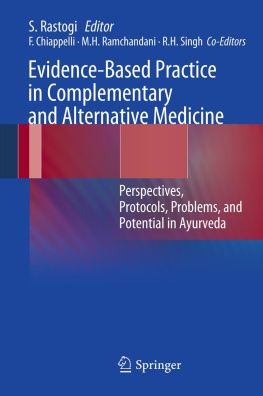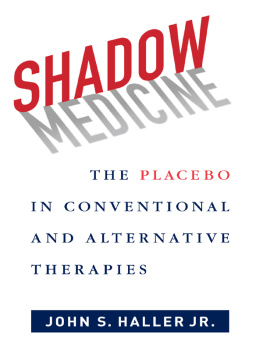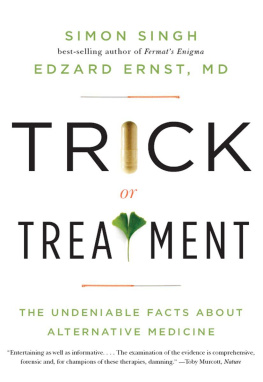Edzard Ernst and Kevin Smith
More Harm than Good?
The Moral Maze of Complementary and Alternative Medicine
Edzard Ernst
University of Exeter, Exeter, UK
Kevin Smith
School of Science, Engineering and Technology, Abertay University, Dundee, UK
ISBN 978-3-319-69940-0 e-ISBN 978-3-319-69941-7
https://doi.org/10.1007/978-3-319-69941-7
Library of Congress Control Number: 2017957706
Springer International Publishing AG 2018
This work is subject to copyright. All rights are reserved by the Publisher, whether the whole or part of the material is concerned, specifically the rights of translation, reprinting, reuse of illustrations, recitation, broadcasting, reproduction on microfilms or in any other physical way, and transmission or information storage and retrieval, electronic adaptation, computer software, or by similar or dissimilar methodology now known or hereafter developed.
The use of general descriptive names, registered names, trademarks, service marks, etc. in this publication does not imply, even in the absence of a specific statement, that such names are exempt from the relevant protective laws and regulations and therefore free for general use.
The publisher, the authors and the editors are safe to assume that the advice and information in this book are believed to be true and accurate at the date of publication. Neither the publisher nor the authors or the editors give a warranty, express or implied, with respect to the material contained herein or for any errors or omissions that may have been made. The publisher remains neutral with regard to jurisdictional claims in published maps and institutional affiliations.
Printed on acid-free paper
Copernicus Books is a brand of Springer
The registered company is Springer International Publishing AG
The registered company address is: Gewerbestrasse 11, 6330 Cham, Switzerland
To Danielle
Edzard Ernst
To Louise, Primrose and Abigail
Kevin Smith
Preface
There are hundreds of books on complementary and alternative medicine (CAM). They cover all imaginable aspects of the subject, yet hardly any of them discuss the often-serious ethical problems created by the current popularity of CAM.
Why is that?
Most consumers seem to think that ethical issues are academic, bone dry, uninteresting and not relevant to them. We believe that this view is very wrong, so much so that we have written this book which is entirely focused on the ethical problems that arise in CAM.
Ethical issues in medicine affect all of us, and the more actively that individuals engage with ethical discourse and decision-making the better. However, if medical ethics were merely an academic subject, impenetrable to nonspecialists, it would have little practical value. Accordingly, in this book, we will refer to formal academic ethical theory only where necessary; wherever possible, our discussions will be based on straightforward argumentation and will refer only occasionally to theory. But, where appropriate, we will utilise theoretical approaches to help analyse specific ethical issues that arise in CAM. For those unfamiliar with the principles of medical ethics, a more in-depth introduction is provided in the Introduction to Medical Ethics section which follows this foreword.
In all areas of healthcareand CAM is no exceptionconsumers are entitled to expect certain basic ethical precepts to be satisfied. These include the following:
- Competence: healthcare practitioners should be sufficiently skilled and knowledgeable such that their clinical practice is effective and their medical advice is valid and up to date.
- Evidence: proffered treatments and diagnostic procedures should be based upon valid knowledge, obtained through robust processes of scientific research.
- Education: programmes of practitioner education and training should ensure that only qualified, competent practitioners are licensed to practice; these programmes should impart the ability to think critically such that evidence can be evaluated in an impartial fashion.
- Autonomy : patients should be at liberty to choose whether to employ a treatment, with full information being provided to explain how the proposed therapy works, along with its risks and benefits. Additionally, if any other effective therapeutic options exist, these should be fairly presented.
- Honesty: CAM professionals should behave truthfully; this includes practitioners, professional bodies, clinics and sellers of CAM therapies.
- Absence of exploitation: patients, clinical trial participants and consumers should be confident that they will not be taken advantage of or abused.
These essential elements of medical ethics are supported by all of the formal ethical approaches and principles outlined in the next section. As we shall explore in this book, these basic ethical requirements are frequently neglected, ignored or wilfully violated in CAM. We feel it is important to disclose these problems and discuss them critically. Only then can we hope to make progress and hope to serve the best interests of patients and consumers.
Edzard Ernst
Kevin Smith
Exeter, UK, Dundee, UK
Acknowledgements
We owe a debt of gratitude to Prof. David Colquhoun for his generous help with the statistical aspects of this book.
Introduction to Medical Ethics
This introduction is aimed at those readers who are unfamiliar with the principles, frameworks and approaches used in medical ethics. Those already familiar with the basic ethical concepts used in medicine are invited to ignore this section and instead turn directly to Chapter .
Medical ethics is a scholarly discipline and like all academic areas contains its own language and theory. A number of formal theoretical frameworks and principles are utilised by medical ethicists in their analyses of ethical problems. However, in this book our ethical points will be based on straightforward argumentation wherever possible. We will refer to formal academic ethical theory only where necessary and always avoid impenetrable or abstruse theory.
However, since ethical frameworks and principles form the substance of professional ethical discourse, it will be useful for the reader to have a broad understanding of these. And, while avoiding undue reliance on formal ethical theory, we will where appropriate utilise theoretical approaches to help analyse specific ethical issues that arise in CAM.
Throughout this book, our ethical considerations of the issues raised by CAM will be based on an ethical approach known as utilitarianism. This ethical framework, which seeks to evaluate the consequences of behaviours and decisions in medicine, is explained in some depth below. Utilitarianism is frequently employed in medical ethics; however, it is not the only approach available or defendable. We think it will be valuable for readers to have some knowledge of the other major ethical approaches that are used in medicine, since this will provide context for the utilitarian approach, and help to show how the other major ethical approaches reach broadly the same basic conclusions about the ethics of CAM as arrived at by utilitarian reasoning.
Thus, we set out below the major approaches used in medical ethics. (It is worth noting that these approaches are also employed in ethics more generally, not only in the domain of medicine.)



